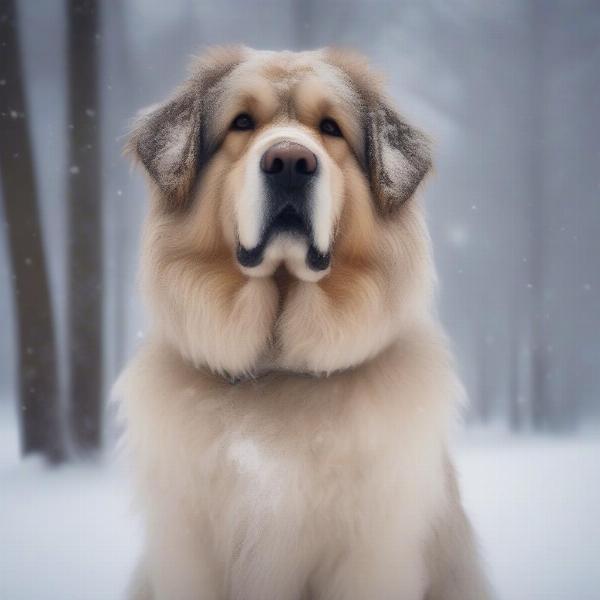The phrase “dog and shake” often brings to mind the image of a wet dog shaking off excess water after a bath or swim. While this is the most common association, the act of shaking in dogs encompasses much more than just drying off. It can be a sign of excitement, anxiety, or even a medical issue. Understanding why your dog shakes can provide valuable insights into their overall well-being.
Why Does My Dog Shake?
Dogs shake for a variety of reasons, ranging from the perfectly normal to potentially concerning. Here’s a breakdown of the common causes:
-
Drying Off: This is the most obvious reason. The physics of a dog’s shake are remarkably efficient, allowing them to shed up to 70% of the water on their fur in just seconds.
-
Releasing Tension: Just like humans might stretch or fidget after a period of stillness, dogs often shake to release pent-up energy or nervous tension. You might notice this after they wake up from a nap, or following a stressful situation.
-
Excitement: A happy, excited dog will often shake their whole body, sometimes accompanied by playful barks or jumps. This is their way of expressing joy and enthusiasm.
-
Anxiety or Fear: Shaking can also be a sign of anxiety or fear. If your dog is shaking in a specific situation, such as during a thunderstorm or when meeting new people, it could indicate they are feeling uncomfortable.
-
Pain or Discomfort: If your dog is shaking more frequently than usual, and there’s no obvious trigger like being wet or excited, it could be a sign of pain or discomfort. This could be due to anything from an injury to an underlying medical condition.
Identifying the Cause of Shaking
Determining why your dog is shaking requires careful observation. Consider the context:
-
What happened just before the shaking started? Did they get wet, interact with another dog, or experience something potentially frightening?
-
Are there any other accompanying symptoms? Are they also licking or scratching a particular area, whining, limping, or showing any other signs of distress?
-
How frequent and intense is the shaking? Occasional shaking is usually normal, but persistent or violent shaking should be investigated by a vet.
When to Consult a Vet
While most shaking is harmless, there are instances when veterinary attention is necessary. Consult your vet if your dog’s shaking:
- Is sudden and unexplained
- Is accompanied by other symptoms like lethargy, vomiting, or loss of appetite
- Is severe or prolonged
- Seems to be causing them pain or distress
 Dog shaking due to being cold in winter
Dog shaking due to being cold in winter
Helping Your Anxious Dog
If your dog’s shaking is due to anxiety or fear, there are steps you can take to help them feel more secure. These include:
-
Creating a safe space: Provide a comfortable den or bed where they can retreat when feeling overwhelmed.
-
Desensitization and counter-conditioning: Gradually expose your dog to the things that trigger their anxiety, pairing it with positive experiences like treats and praise.
-
Maintaining a calm environment: Avoid sudden loud noises or chaotic situations that might exacerbate their anxiety. A water resistant dog blanket can provide comfort and warmth in stressful situations.
Conclusion
Understanding your dog’s “dog and shake” behavior is a key part of responsible pet ownership. By paying attention to the context and accompanying symptoms, you can differentiate between normal shaking and potential health concerns. If you’re unsure, always consult your vet for professional advice.
FAQ
-
Q: Why does my dog shake after getting wet? A: Shaking helps dogs quickly and efficiently remove water from their fur.
-
Q: Is it normal for my dog to shake when they’re excited? A: Yes, shaking can be a sign of excitement and joy in dogs.
-
Q: Can shaking be a sign of pain in dogs? A: Yes, unexplained or persistent shaking can sometimes indicate pain or discomfort.
-
Q: What should I do if my dog is shaking uncontrollably? A: Contact your veterinarian immediately, as this could be a sign of a serious medical issue.
-
Q: How can I help my anxious dog who shakes frequently? A: Create a safe space for them, use desensitization techniques, and maintain a calm environment. Consider using a stuffed monkey dog toy to comfort them.
-
Q: What if my dog is shaking and also vomiting? A: Contact your vet immediately. This could indicate a serious medical issue.
-
Q: Could shaking be related to my dog’s diet? A: While rare, certain dietary deficiencies can cause tremors or shaking. Consult with your vet about your dog’s nutrition. You can also use an absorbent dog bowl mat to keep their eating area clean.
ILM Dog is your trusted resource for all things dog-related. We offer expert advice on dog breeds, health, training, nutrition, grooming, and much more. Whether you’re a seasoned dog owner or just starting out, we’re here to help you provide the best possible care for your furry friend. For any questions or concerns, please don’t hesitate to contact us via email at [email protected] or by phone at +44 20-3965-8624. Visit ILM Dog today! We also have a range of products such as a truck back seat cover for dogs and simplera otic solution for dogs available on our website.